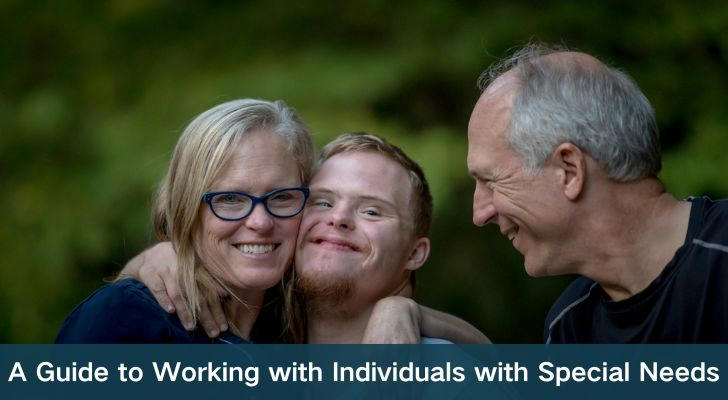A Guide to Working with Individuals with Special Needs
Working with individuals with special needs requires patience, understanding, and specialized knowledge. These individuals may experience physical, intellectual, developmental, emotional, or sensory challenges, and they benefit from tailored approaches in education, care, and communication. Whether in schools, homes, or community programs, support professionals play a vital role in helping people reach their fullest potential.

Part One: Understanding Special Needs
The term "special needs" refers to a broad spectrum of conditions that may affect how a person learns, communicates, moves, or interacts with others. These can include:
- Autism spectrum disorder (ASD)
- Down syndrome
- Cerebral palsy
- ADHD
- Sensory processing disorders
- Intellectual disabilities
- Speech and language delays
Each person’s needs are different. A respectful and individualized approach is essential in providing effective support.
Part Two: Core Qualities of Effective Support Professionals
Providing care or instruction for individuals with special needs involves both interpersonal strengths and practical knowledge. Professionals in this field often demonstrate:
- Empathy: Understanding and respecting each person’s unique experience
- Adaptability: Adjusting strategies when something isn’t working
- Clear communication: Using verbal, visual, or physical cues as needed
- Consistency: Creating a structured and predictable environment
- Observation skills: Recognizing nonverbal signals or behavior patterns
- Teamwork: Collaborating with families, educators, and healthcare providers
These qualities support stronger relationships and more effective outcomes for individuals in care.
Part Three: Common Settings and Roles
Professionals who work with individuals with special needs can be found in many environments, such as:
- Public and private schools
- Early intervention programs
- Residential care homes
- Hospitals and therapy clinics
- Community integration programs
Roles include:
- Teaching assistants
- Personal care aides
- Behavioral support workers
- Special education paraprofessionals
- Job coaches or transition coordinators
Each setting may require a different level of training, but a commitment to respectful support is always central.

Part Four: Training and Educational Pathways
Working in special needs support doesn’t always require a four-year degree, but relevant training is important. Depending on the position, requirements may include:
- High school diploma or equivalent
- Certificate programs in special education, disability services, or behavioral support
- Associate or bachelor’s degrees in education, psychology, or human services
Additional qualifications can include:
- CPR and first aid certification
- Crisis de-escalation training
- Knowledge of assistive technology
- Understanding of Individualized Education Plans (IEPs) and 504 Plans
Some programs include hands-on practicum or internship hours to build confidence and experience.
Part Five: Communication Strategies
Communication is a key part of supporting individuals with special needs. Some individuals may be nonverbal or use alternative forms of expression. Effective strategies include:
- Using simple and direct language
- Incorporating visuals, gestures, or communication devices
- Allowing extra time for processing or responding
- Listening actively and observing body language
- Being consistent with cues and routines
Every individual communicates differently. The goal is to create a supportive space where they feel understood and empowered.
Part Six: Career Outlook and Opportunities
The demand for trained support professionals continues to grow. According to the U.S. Bureau of Labor Statistics, employment of special education aides and personal care aides is projected to increase significantly through 2032, reflecting ongoing needs in schools and communities.
(Source: U.S. Bureau of Labor Statistics, Occupational Outlook Handbook)
Over time, professionals may choose to pursue specialized roles, such as:
- Behavioral technician
- Special education teacher
- Program supervisor
- Disability services coordinator
Continued learning and experience can lead to career advancement in both educational and clinical settings.

Conclusion
Supporting individuals with special needs is a meaningful and rewarding path for those who value patience, connection, and lifelong learning. Whether helping a child succeed in school or supporting an adult toward independence, professionals in this field make a lasting impact on the lives of others.
With the right training and mindset, anyone with a genuine interest in inclusive support can find purpose and fulfillment in this vital line of work.
References:
- U.S. Bureau of Labor Statistics
- National Center on Disability and Access to Education (NCDAE)
- Council for Exceptional Children (CEC)
